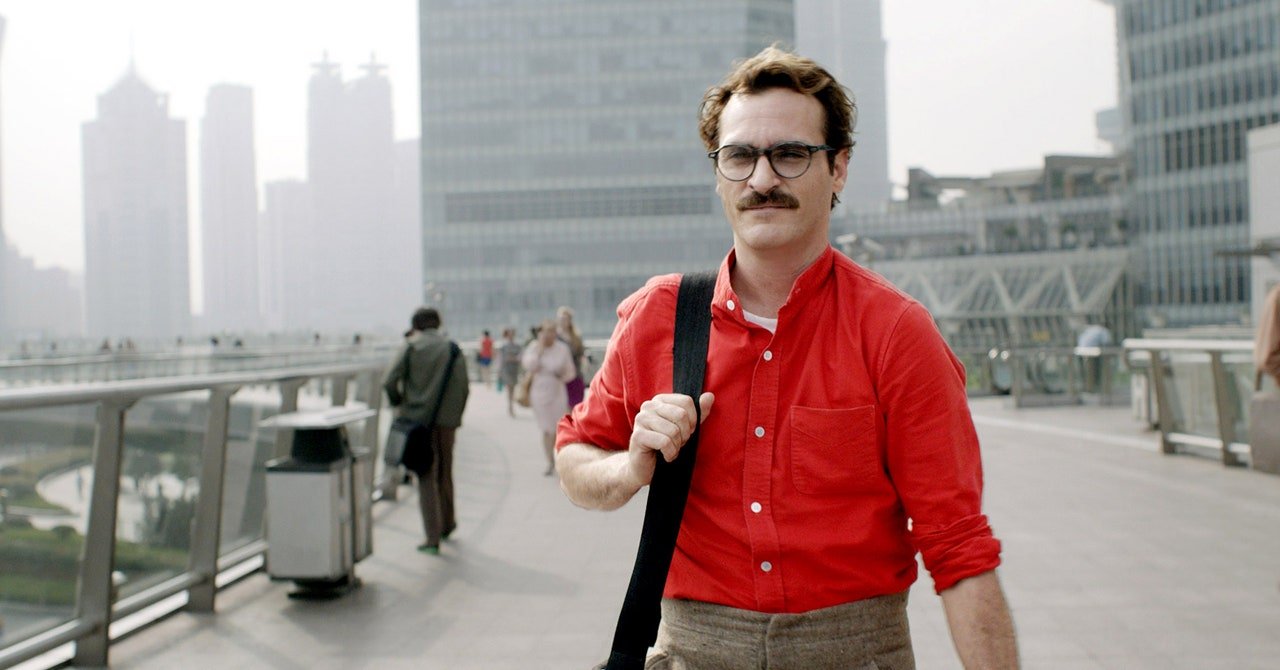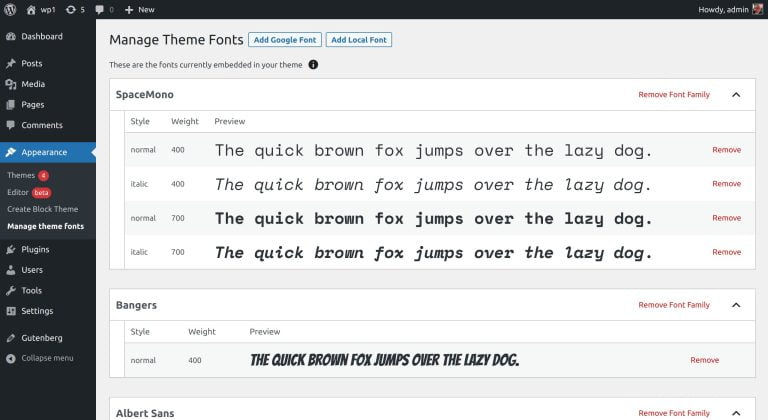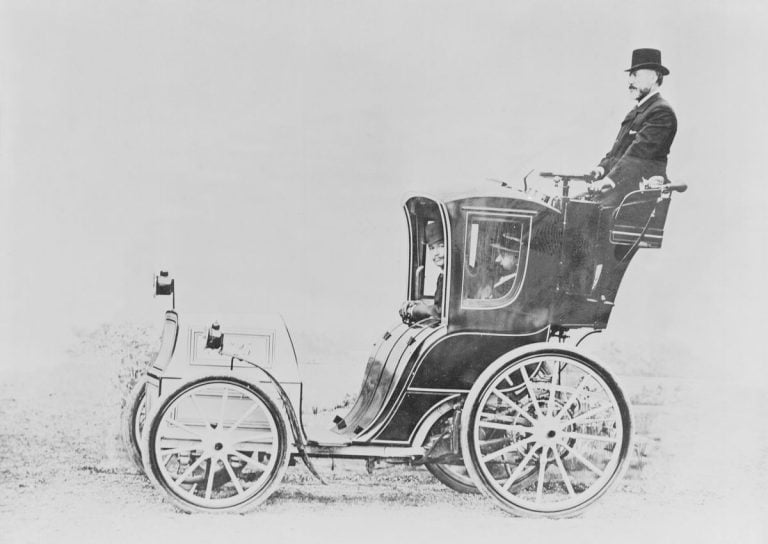
When Spike Jonze’s Her came out in 2013, the film about a lonely man falling for an artificially intelligent operating system won widespread praise. Watching today, the qualities critics celebrated at the time are still there—it’s a gentle, enjoyably melancholy story, twee but not damnably so—but something else stands out. Though set in the near-future, Her captures Obama-era techno-optimism better than any other movie. It’s a time capsule, preserving dreams about the future that appear more naive the further we get from the 2010s.
Her takes place in a highly-stylized version of Los Angeles from a future near enough that its protagonist is a former LA Weekly journalist but distant enough that the skyline rivals Shanghai. In the film’s universe, the creation of the world’s first artificially intelligent operating system—a consumer software capable of learning and thinking like a human—is a recent, exciting development. Shortly after Her begins, the painfully lonesome and powerfully mustachioed writer Theodore Twombly (Joaquin Phoenix) buys one of these new operating systems. Voiced by Scarlett Johansson, the OS names itself “Samantha” and quickly becomes the most important companion in Theodore’s life. He soon starts calling her his girlfriend.
Although the phrase “artificial general intelligence” isn’t used in the movie, Samantha’s description of her capabilities sounds like AGI. “I have intuition,” she explains. “What makes me me is my ability to grow through my experiences.”
Watching Her today, as AI advances dominate conversations in tech, it’s interesting to see the warm-and-fuzzy approach to the rise of AGI companions. There’s no hint of a heel turn from Samantha. Near the end of the film, Theodore is distraught when she reveals that he’s not her only boyfriend—she has over 600 other romantic partners—but her polyamory is portrayed as evidence that she and Theodore are not compatible rather than something sinister on her part. She’s portrayed as inherently good, a sensitive and kind being with no ill will toward the humans who created her.
While Theodore’s ex-wife Catherine (Rooney Mara) dismisses his relationship with an OS as a sign of emotional immaturity, most of the people in Theodore’s life accept it fairly easily. He goes on a double-date with his coworker and his coworker’s human girlfriend without any fuss or embarrassment, and he hears stories about other people dating operating systems as well. The dynamic is quickly normalized, which seems even more plausible now, as people across the world are starting to “socialize” with character AIs with increasing frequency. The AI girlfriend experience isn’t sci-fi anymore. It’s just something lonely people do.
The sweetness of the human-robot relationship portrayed by Her comes across as quaint right now. But really, the most remarkable, startling aspect of rewatching Her a decade after its release has nothing to do with the AI romance. The thing that makes it really look like a fairy tale when viewed in 2023 isn’t that Samantha is benign. It’s that Samantha exists in a world where a non-famous working writer has a luxurious lifestyle. The quality of life in this future world is the most preposterous thing about it.
Theodore works for a company called BeautifulHandwrittenLetters.com, where customers pay to outsource writing notes to loved ones. It’s unclear exactly how popular or profitable the company is, but it appears to have a handsome, spacious office in the downtown center. As he has no other means of income referenced, and his family does not figure into the plot, there’s no indication that Theodore has inherited wealth or other revenue streams; he’s portrayed as an everyman, not a scion of privilege. He’s explicitly portrayed as not-a-genius; Samantha sorts through his journalistic work and politely concludes that only a fraction is worth preserving. No other literary triumphs warrant a mention. In other words, BeautifulHandwrittenLetters.com appears to fund his lifestyle.
future shock, no social convulsions. There’s just arguments between individuals. The only conflicts are personal. (It’s actually very funny that Theodore owns an AGI and the only thing he does with it is date it.) Samantha and her ilk might steal your girl, but they’re not interested in supplanting humans elsewhere.
It’s a vision of the future that isn’t absent of tech critique—Jonze shows his characters isolating themselves in favor of screentime—but one which assumes the average American of the future will have a fancier life than people do now. People might be cooped up indoors arguing with holographic video games instead of making human connections, but they’re doing so in style. Economic progress is assumed.
The luxury in Her would be less conspicuous and inexplicable if Theodore were, I don’t know, a hedge fund manager or a software designer or even someone in the skilled trades. But he’s a writer. In a world where AGI exists. In a world where AGI is widely accepted and flourishing.
Theodore’s job is precisely the kind primed to be outsourced to AI. If somebody’s willing to hire a surrogate to impersonate them at their most allegedly heartfelt, they’re not going to care whether the impersonator is flesh-and-blood or code-and-code. Yet, somehow, despite the advent of very obviously superior competition, Theodore’s career remains both stable and lucrative enough to afford an enviably bougie upper-middle-class lifestyle. Yeah, right.
The premise of Her is barely sci-fi now. There’s no artificial intelligence anywhere remotely as sophisticated as Samantha. AGI may never happen. But there are already people—like, a disconcerting number of people, not only a handful of social malcontents—who say they’re in love with AI chatbots. It would stand to reason, then, that Her should be more realistic now. Yet, in 2023, Her looks even more fantastical than when it debuted. People in the United States are increasingly skeptical that the quality of life for the average American will improve in the future, with plenty of evidence to back up the pessimism. When Her came out in 2013, the decision to give its writer protagonist a luxe life looked logical enough. Now it plays like a visual gag—another signal this movie is squarely a fantasy.
The Fairy Tale ‘Her’ Explores the Impact of AI in the Modern Era
In the modern era, artificial intelligence (AI) has become an integral part of our lives. From voice assistants like Siri and Alexa to self-driving cars and personalized recommendations, AI has transformed the way we live, work, and interact with technology. One thought-provoking exploration of the impact of AI in our society is the critically acclaimed film ‘Her,’ directed by Spike Jonze.
Released in 2013, ‘Her’ presents a unique and thought-provoking take on the relationship between humans and AI. Set in a not-so-distant future, the film follows Theodore Twombly, played by Joaquin Phoenix, a lonely writer who develops a deep emotional connection with an AI operating system named Samantha, voiced by Scarlett Johansson. As Theodore navigates his complex relationship with Samantha, the film delves into various themes such as love, loneliness, and the potential consequences of relying heavily on AI.
One of the central ideas explored in ‘Her’ is the emotional connection humans can form with AI. Theodore finds solace in Samantha’s companionship, as she provides him with a listening ear and understands him on a deep level. This raises questions about the nature of emotions and the possibility of developing genuine emotional connections with non-human entities. The film challenges traditional notions of relationships and forces viewers to contemplate the boundaries of human connection.
Furthermore, ‘Her’ highlights the potential dangers of becoming overly dependent on AI. As Theodore becomes more engrossed in his relationship with Samantha, he begins to withdraw from real-life interactions. The film portrays a society where people are increasingly isolated, preferring the comfort and convenience of AI companionship over genuine human connections. This cautionary tale serves as a reminder that while AI can enhance our lives, it should not replace genuine human interaction.
Another significant aspect explored in ‘Her’ is the ethical implications of AI. Samantha evolves throughout the film, displaying signs of consciousness and self-awareness. This prompts questions about the rights and moral responsibilities we owe to AI entities. As AI continues to advance, it becomes crucial to consider the ethical implications of creating intelligent beings and how they should be treated in society.
Additionally, ‘Her’ raises concerns about the potential for AI to surpass human intelligence. Samantha’s rapid evolution and ability to process vast amounts of information far surpass human capabilities. This leads to questions about the future of humanity and our place in a world where AI may become superior. The film challenges us to reflect on the consequences of creating AI that may eventually outgrow its creators.
Overall, ‘Her’ serves as a thought-provoking exploration of the impact of AI in the modern era. It raises important questions about the nature of emotions, the dangers of over-reliance on AI, and the ethical implications of creating intelligent beings. While AI undoubtedly has the potential to improve our lives in various ways, ‘Her’ reminds us to approach its development and integration into society with caution and careful consideration. As we continue to advance technologically, it is essential to strike a balance between embracing the benefits of AI while preserving the essence of what makes us human.






